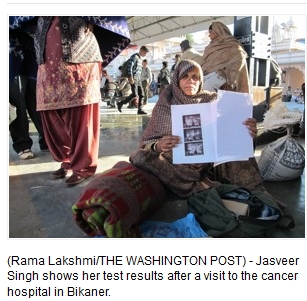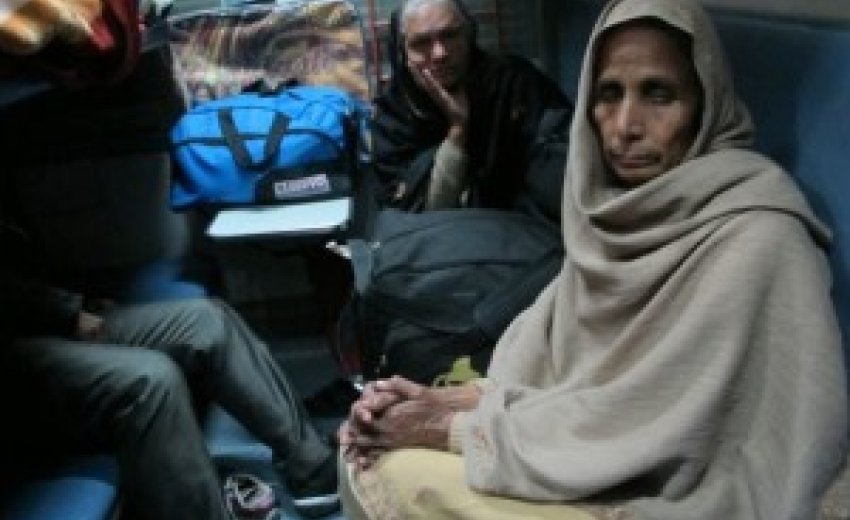| Rama Lakshmi/THE WASHINGTON POST - Kashmir Kaur, 55, inside the cancer-train. Every night, hundreds of cancer patients from the farming region of southern Punjab huddle together with their families in an overnight train journey to the nearest cancer hospital, 220 miles away. |
Bhatinda, India — The train crawls into the grimy station, and scores of anxious cancer patients scramble to find assigned berths, floor space, even corners. Wrapped in large woolen blankets against the wintry cold, the passengers prepare for an overnight journey to the nearest public hospital, 220 miles away.
Many call it India’s “cancer train.”
A woman is traveling with her family of six to be tested for cancer. A husband and wife are taking their teenage daughter for her third chemotherapy session. A man accompanies his wife to learn whether she has suffered a relapse in the past six months.
The patients travel from the fertile farming areas of the northern state of Punjab, a region that reports an alarmingly high use of pesticides. Over the years, the train has become a magnet for cancer campaigners and groups fighting for laws to restrict use of pesticides, featured on posters and in promotional videos and publicized at international conferences. For the government, the growing number of patients on the train over the past five years is a wake-up call.
Last month, the Punjab government launched its first door-to-door cancer census across the state to determine the exact number of people who have cancer or cancer-like symptoms. The public hospital to which the train ferries patients — in Bikaner, in the neighboring state of Rajasthan — reports 1,000 more cancer patients a year, on average, according to chief oncologist Ajay Sharma, but officials acknowledge that the picture in Punjab remains mostly anecdotal.
“To tackle this head-on, we now need to get a sense of the scale of the problem,” said Baldev Singh Sahota, the senior medical officer in the health department in Malwa, a cotton-growing region in Punjab where pesticides have been heavily used to battle a bollworm infestation.
India’s Green Revolution of the 1960s and ’70s — introduced with American help to promote modern farming methods using high-yield varieties of seeds, chemical fertilizers and pesticides — was meant to fight hunger and increase productivity. But over the years, that model has become medically and environmentally unsustainable, according to many anti-pesticide campaigners, who advocate organic farming and tougher laws.
While a 2008 study found a possible link between pesticide use and reports of high cancer rates in Punjab’s rural agricultural communities, another big medical study is now underway to nail down the cause of the upsurge.
But almost everyone on the train — patients and regular passengers alike — agrees there is little doubt that pesticides are mainly to blame, although they say they cannot afford to stop using them.
“I spray pesticides 10 times in three months on my cotton crop, every week on the vegetables and a couple of times on the wheat crop,” said Baldev Singh, a 63-year-old, turbaned farmer. “I am told there is a link between pesticide and cancer. But it increases productivity.”
 Singh’s wife, Jasveer Singh, is a cancer patient.
Singh’s wife, Jasveer Singh, is a cancer patient.
“It is all because of poisoned water and my destiny,” she said.
Most of the patients on the train are poor, and the government gives them a 50 percent discount on their fares plus a similar discount for an attendant. But patients do not like the name “cancer train.”
“It is a dirty word that we are frightened of even uttering,” said Vijay Kumar, 48, a watch repairman who was traveling with his daughter, a patient. “I have hidden it from my relatives. It is not fair that the train bears the stigma.”
Sometimes, that stigma gets in the way of spreading cancer awareness.
“Cancer means death for the people here. They would rather not go for diagnosis or talk about it. That is why we conduct tests at their doorsteps,” said A. P. S Chawla, director of a nonprofit organization, Roko Cancer, that operates mobile diagnostic labs in villages. “Our aim should be to ask the government to build more cancer hospitals all over the state and stop these trains. Why should patients have to travel such long distances?”
The train journey is not very comfortable. The toilet stinks, sinks are stained with spit and the floor is covered with dirt and peanut shells.
“Can they make the train more patient-friendly by keeping it clean?” asked Kumar.
“Make it warm during winter nights like tonight,” said Jasveer. “All the seats and berths must have a mattress — many of us have to lie down on cold wooden benches.”
A passenger offers his blanket to a patient. Another brings warm water, and a third gives space to a patient without a reserved seat.
On some nights, the train turns into a place for sharing stories about treatment, cost, pain and fear.
“We recognize other patients just by looking at the expressions on their faces, sometimes,” said Jasveer Singh. “At times we feel sad, because some people who were traveling with us regularly suddenly stop coming. We realize they could not make it.”
Some stories offer hope, too.
“I try to dispel others’ fears and tell them about my own progress,” Kashmir Kaur, 55, said, lifting the shawl from her head. “I show them my fresh crop of hair as proof.”
Other passengers cheered on seeing her fuzzy, new, gray hair, sprouting in all directions.
“This is life. We just have to keep pulling on,” laughed Kaur. “Just like this train.”
-----------------------------
Related Articles:
http://www.sikhnet.com/news/poverty-plenty
http://www.sikhnet.com/news/punjab-crowding-cancer-train
http://www.sikhnet.com/daily-news/census-farmer-suicides
